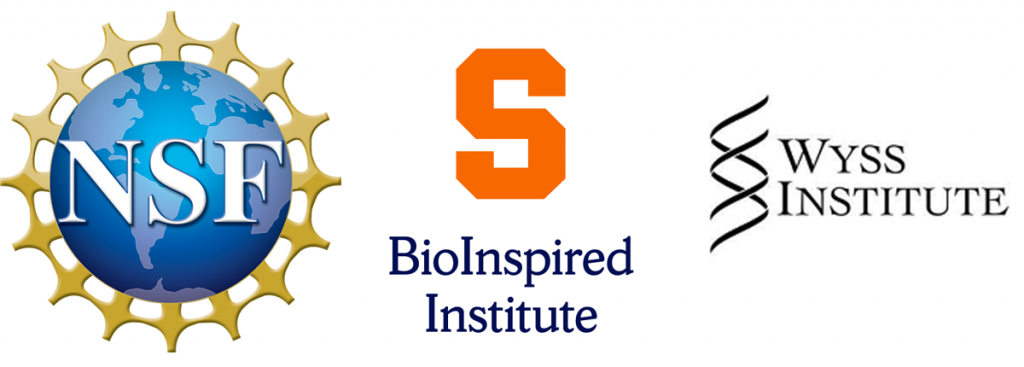
The vision of this NSF-sponsored workshop was to bring together researchers across the Bioinspired Design space to identify the highest value key challenges that are most approachable using Bio-Design, and then to identify hurdles that are currently preventing bio-inspired design ideas from being practicable.
When: October 3-4, 2022
- Afternoon reception, October 3
- Programming all day, October 4
Where: Wyss Institute, Cambridge, MA
Organizers: Lisa Manning, Don Ingber, Wallace Marshall, and Aimy Wissa
The successful workshop resulted in a “Bioinspired Design” National Science Foundation convergence accelerator track for the 2023 Cohort. Examples of 2019 through 2021 cohort tracks can be found here. Launched in 2019, the NSF Convergence Accelerator builds upon basic research and discovery to accelerate solutions toward societal impact. The program funds teams to solve societal challenges through convergence research and innovation. To enhance its impact, the Accelerator also places teams together in cohorts, synergizing their work through facilitated collaboration.
Bioinspired Design is an example of one such convergence research area and has a strong potential to become a convergence topic. Some examples of bio-inspired design solutions that are already being investigated and on the cusp of being useful to society include:
- industrial-scale, climate-friendly manufacturing of proteins, cells, and artificial foods enabled by synthetic biology
- synthetic systems for energy harnessing and storage inspired by living systems
- autonomous robot swarms for construction and civil engineering
- hybrid biomaterials that interact seamlessly with the human body for wound healing and tissue engineering
- nanomaterials that mimic natural structures for enhanced strength, resilience, and enhanced optical properties
- programmable molecular robots for nanofabrication of high density multifunctional materials.
However, researchers in these disparate areas rarely interact with one another, and to our knowledge there had not been any national-scale workshops or conferences in this space. This was a missed opportunity, as it was clear that convergent interactions between these groups could drive innovation. The time was right to share translational best practices to a much wider group and ignite bio-design inspired efforts across the nation.
Participants shaped this workshop into a diverse, interdisciplinary venue to not only produce a competitive convergence accelerator track, but to also serve as the foundation of a research community. Attendees participated in multiple brainstorming activities, discussions, and activities designed to achieve the workshop goals detailed above. The resulting workshop, follow-on activities, and writing exercises resulted in Bio-Inspired Design Innovations to be chosen as Track M for a Phase I competition in 2023. Current awardees are listed here.

